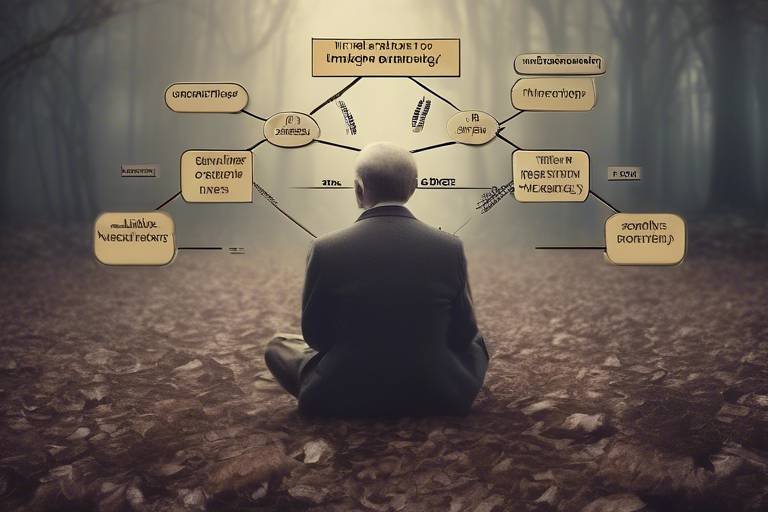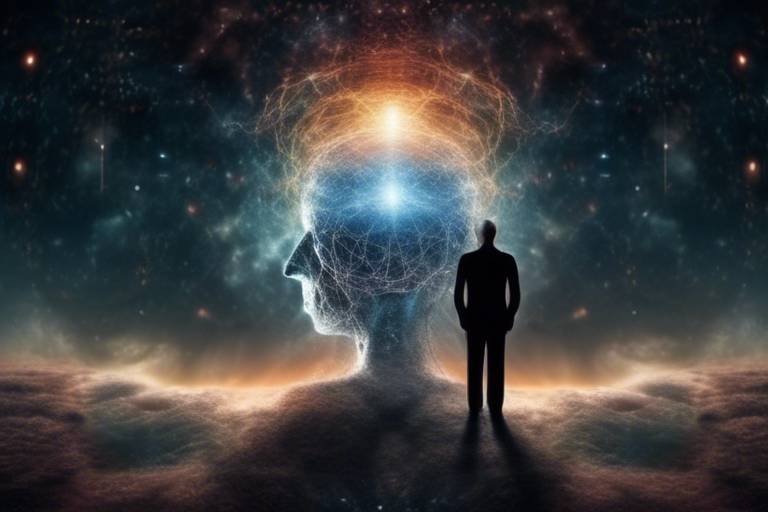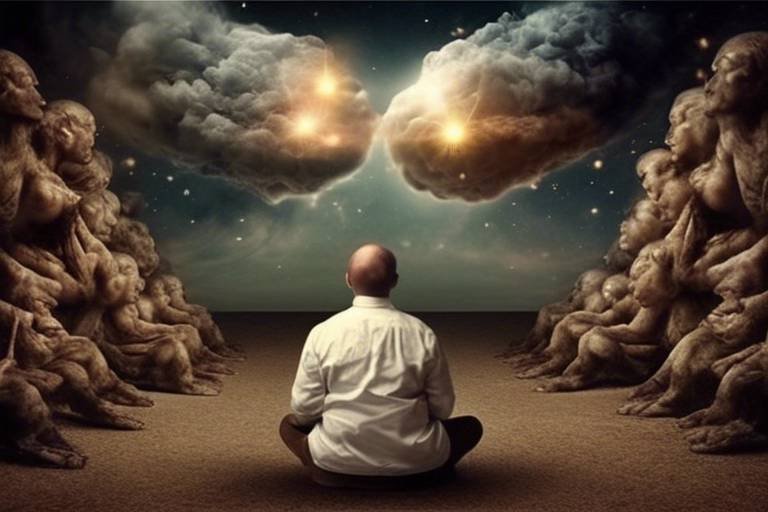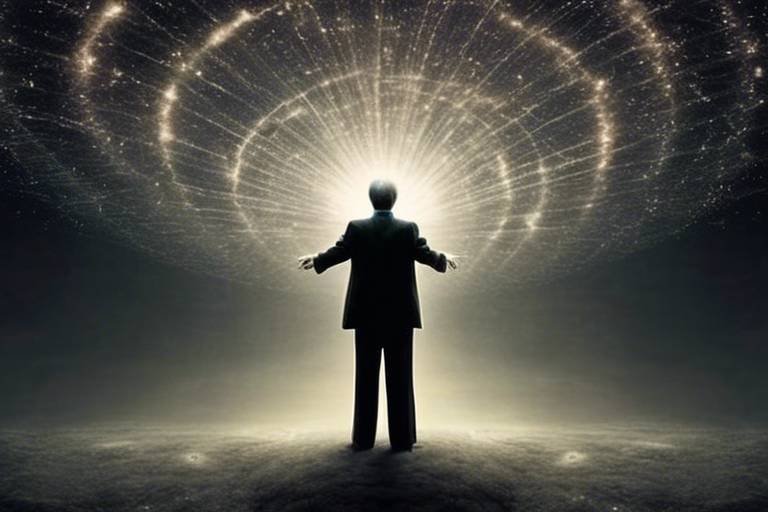Understanding Human Nature through Ontology
Have you ever paused to ponder why we are the way we are? Why do we think, feel, and act in certain ways? The intricate relationship between human nature and ontology offers profound insights into these questions. Ontology, the philosophical study of being and existence, serves as a lens through which we can examine our nature as human beings. By understanding ontology, we can unravel the complexities of our perceptions, behaviors, and interactions within society. It’s like peeling back the layers of an onion—each layer reveals more about the essence of who we are and how we fit into the grand tapestry of existence.
At its core, ontology invites us to explore fundamental questions about existence: What does it mean to be? How do we define our reality? These questions are not just academic; they resonate deeply within our everyday lives. The way we perceive ourselves and others is shaped by our ontological beliefs. For instance, if we view existence as a solitary journey, we may prioritize individualism over community. Conversely, seeing existence as interconnected may foster a sense of belonging and collective responsibility. This interplay between ontology and human nature is crucial, as it influences our ethical frameworks, social norms, and even our personal identities.
As we delve deeper into the realm of ontology, we uncover various philosophical perspectives that have shaped our understanding of human nature throughout history. Think of it as a grand dialogue among philosophers, each contributing their unique insights to the conversation. From Aristotle's emphasis on rationality to modern interpretations that challenge traditional views, each perspective provides a different lens through which we can analyze our existence and behavior.
In the upcoming sections, we will explore these philosophical theories, examining how they inform our understanding of what it means to be human. We will also investigate the relationship between ontology and personal identity, revealing how our understanding of existence influences our self-perception and social interactions. By the end of this exploration, we hope to not only enhance your understanding of human nature but also inspire you to reflect on your own existence and the roles you play in the world around you.
- What is ontology? Ontology is the philosophical study of being and existence, focusing on the nature of reality and what it means to exist.
- How does ontology relate to human nature? Ontology influences our perceptions, behaviors, and interactions, shaping our understanding of what it means to be human.
- Why is understanding human nature important? Understanding human nature helps us navigate our relationships, ethical decisions, and societal roles more effectively.
- What role do philosophers play in understanding human nature? Philosophers provide diverse perspectives that challenge and enrich our understanding of human nature and existence.

The Basics of Ontology
Ontology, at its core, is the philosophical study of being and existence. It delves into questions that are as ancient as philosophy itself: What does it mean to exist? What kinds of entities are there in the universe? These inquiries are not merely academic; they influence how we perceive our own lives and the world around us. Imagine ontology as the lens through which we view reality, shaping our understanding of everything from the mundane to the profound.
To grasp ontology, we must first understand its foundational concepts. At its heart, ontology seeks to categorize and explain the various types of entities that populate our reality. This includes not only physical objects but also abstract concepts like time, space, and even emotions. The study of ontology asks us to consider the nature of these entities and their relationships to one another. For instance, when we ponder the existence of love, we are engaging in an ontological exploration of something that is real yet intangible.
One of the key aspects of ontology is the distinction it makes between different kinds of beings. In philosophical terms, we often differentiate between:
- Concrete Entities: These are tangible things we can perceive with our senses, like trees, animals, and people.
- Abstract Entities: These include concepts like justice, beauty, and numbers, which exist in a different realm of thought.
- Possible Entities: These are hypothetical scenarios or beings that do not currently exist but can be conceived, such as mythical creatures.
These categories help us navigate our understanding of existence and the nature of reality. Furthermore, ontology is not static; it evolves as our understanding of the universe changes. For example, the advent of quantum physics has challenged traditional ontological views, prompting philosophers and scientists alike to reconsider what it means for something to exist. The implications of these discussions extend far beyond academia, influencing fields such as ethics, politics, and even art.
Moreover, ontology plays a crucial role in shaping our understanding of human nature. By examining what it means to exist, we can better comprehend our own identities and the essence of our interactions with others. This connection between ontology and human nature is not just theoretical; it has practical implications for how we engage with the world. For instance, recognizing that our identities are shaped by both our personal experiences and the broader societal context can lead to a deeper understanding of empathy and social responsibility.
In summary, ontology is not merely a philosophical abstraction but a vital framework that informs our understanding of existence. It compels us to ask profound questions about the nature of reality and our place within it. As we continue to explore these concepts, we gain insights that can enhance our lives and our interactions with others, ultimately leading to a richer understanding of what it means to be human.

Human Nature: A Philosophical Perspective
When we dive into the depths of human nature, we uncover a rich tapestry of thoughts and beliefs that have evolved through centuries of philosophical inquiry. From the ancient Greeks to modern thinkers, the quest to understand what it means to be human has sparked countless debates and theories. At its core, the exploration of human nature is not just an academic exercise; it's a reflection of our very existence and our place in the world. Have you ever pondered why we behave the way we do or why we form the connections we cherish? These questions are at the heart of philosophical discussions about human nature.
Throughout history, various philosophers have approached the concept of human nature through different lenses. For instance, some have emphasized our inherent rationality, while others have pointed to our emotional and social instincts. This diversity in thought highlights a fundamental truth: human nature is complex and multifaceted. Theories abound, each offering unique insights into our behaviors, motivations, and the essence of what it means to be human. In this discussion, we will explore some of the most influential perspectives that have shaped our understanding of human nature.
One of the most significant contributions to the philosophy of human nature comes from Aristotle, who viewed humans as rational beings. According to him, our ability to reason sets us apart from other creatures. But what does this rationality entail? Aristotle believed that rationality is not just about logical thinking; it's about understanding the world around us and making ethical choices based on that understanding. This perspective invites us to consider how our decision-making processes reflect our nature as rational beings. It challenges us to ask ourselves: are we truly living up to our potential as rational creatures?
Aristotle's connection between rationality and ethics is profound. He argued that to be truly human, one must engage in rational thought to discern right from wrong. This ethical framework is not merely theoretical; it has practical implications for how we live our lives. For instance, when faced with a moral dilemma, do we rely on our emotions, or do we engage our rational faculties to navigate the situation? Aristotle's view compels us to reflect on the role of reason in our ethical decision-making. It suggests that our capacity for rational thought is not just an attribute but a fundamental aspect of our humanity.
Central to Aristotle's philosophy is the concept of virtue, which he believed is essential in shaping human nature and moral character. Virtue, in Aristotle's view, is about finding the balance between extremes—what he termed the "Golden Mean." For example, courage lies between recklessness and cowardice, while generosity sits between prodigality and stinginess. This idea invites us to consider how cultivating virtues can enhance our human experience. It raises the question: how can we strive for balance in our lives to become the best versions of ourselves? Aristotle's emphasis on virtue underscores the importance of character in the philosophical discourse on human nature.
Fast forward to today, and we find that modern philosophers have expanded upon, challenged, and even rejected some of the classical views on human nature. Contemporary thought often incorporates insights from psychology, sociology, and neuroscience, leading to a more nuanced understanding of what it means to be human. For example, while some modern theorists emphasize the biological aspects of human nature, others focus on cultural influences and the role of social constructs. This blend of perspectives highlights the ongoing dialogue about human nature and its relevance in addressing current societal issues.
In summary, the exploration of human nature from a philosophical perspective reveals a rich landscape of ideas that continue to evolve. Whether through Aristotle's emphasis on rationality and virtue or the diverse modern interpretations, understanding human nature is crucial for navigating our experiences and interactions in an increasingly complex world. So, what do you think defines our humanity? Is it our capacity for reason, our emotional depth, or perhaps something else entirely?
- What is the main focus of ontology in relation to human nature? Ontology primarily examines the nature of being and existence, which directly influences our understanding of human nature and identity.
- How did Aristotle's views shape our understanding of ethics? Aristotle connected rationality to ethical behavior, suggesting that our ability to reason is fundamental to making moral choices.
- What are some modern perspectives on human nature? Modern interpretations often incorporate insights from various fields, including psychology and sociology, leading to a more comprehensive understanding of human behavior.
- Why is virtue important in understanding human nature? Virtue is essential as it shapes our moral character and helps us find balance in our actions, contributing to our overall humanity.

Aristotle's View on Human Nature
When we dive into the rich philosophical waters of Aristotle’s thoughts on human nature, we find ourselves grappling with the essence of what it means to be human. For Aristotle, the cornerstone of human existence lies in our capacity for rationality. He posits that unlike other creatures, humans possess the unique ability to reason, which fundamentally shapes our identity and behavior. This rational aspect is not merely an intellectual exercise; it plays a crucial role in how we navigate our lives, make decisions, and interact with others. Imagine a compass guiding a traveler through a dense forest—this rationality is that compass, directing us toward ethical living and fulfilling our potential.
Aristotle categorizes humans as rational animals, emphasizing that our ability to think critically sets us apart from the rest of the animal kingdom. This distinction is significant because it underlines the responsibility that comes with our rationality. With great power comes great responsibility, right? Aristotle believed that our capacity for reason is what enables us to pursue virtue and live a good life. In his view, the ultimate goal of human existence is to achieve eudaimonia, often translated as "flourishing" or "the good life." This state of being is attainable through the practice of virtue, which is itself rooted in rational thought.
Now, let’s explore the connection between rationality and ethics in Aristotle's philosophy. He argued that ethical behavior is not simply about following rules or societal norms; rather, it’s about cultivating virtues that arise from rational deliberation. For instance, consider the virtue of courage. Aristotle would assert that true courage is not the absence of fear but the rational assessment of when to act bravely in the face of fear. Thus, the ethical life is a balanced one, guided by reason. This idea can be distilled into a simple formula:
| Virtue | Definition | Example |
|---|---|---|
| Courage | The rational response to fear | Standing up for what is right |
| Temperance | Moderation in all things | Practicing self-control |
| Justice | Fairness and equality in treatment | Ensuring everyone gets their due |
In addition to rationality and ethics, Aristotle’s view of human nature also encompasses the idea of virtue. He believed that virtues are not innate; rather, they are developed through habit and practice. Just as a musician hones their craft through repetition and dedication, so too must individuals cultivate virtues to shape their moral character. This process of becoming virtuous is a lifelong journey, one that requires self-reflection and a commitment to personal growth.
Aristotle’s insights into human nature remind us that our existence is not merely about survival; it’s about striving for excellence and understanding our place in the world. By embracing our rationality and striving towards virtue, we can navigate the complexities of life with greater clarity and purpose. So, the next time you face a moral dilemma, think back to Aristotle’s teachings—let your reason guide you, and remember that you are not just a creature of instinct but a rational being capable of profound ethical thought.
- What is Aristotle's definition of human nature?
Aristotle defines human nature as the capacity for rational thought and ethical behavior, emphasizing that humans are rational animals who strive for eudaimonia. - How does rationality influence ethical behavior according to Aristotle?
Aristotle believes that rationality allows individuals to assess situations and make informed ethical choices, leading to the cultivation of virtues. - What role do virtues play in Aristotle's philosophy?
Virtues are essential for achieving a good life; they are developed through practice and lead to moral character and ethical living.

Rationality and Ethics
When we dive into the intricate relationship between rationality and ethics, we find ourselves navigating through the profound thoughts of Aristotle, who believed that our capacity for reason is what fundamentally distinguishes us as human beings. But what does this really mean? At its core, rationality serves as the backbone of ethical behavior, guiding us in our decision-making processes and shaping our moral compass. Imagine walking through a dense forest—without a map or a sense of direction, you might easily get lost. In this analogy, rationality is your compass, helping you discern right from wrong, good from bad, and guiding your path through the complexities of life.
Aristotle posited that the exercise of rational thought is not merely an intellectual endeavor; it is deeply intertwined with our ethical responsibilities. He argued that to be truly human, one must engage in virtuous actions that reflect reasoned choices. This means that rationality is not just about cold calculations or logical deductions; it encompasses a broader understanding of our values and the implications of our actions. For Aristotle, the ethical life is one where rationality and virtue are inseparable, leading individuals to achieve their highest potential—what he termed eudaimonia, or human flourishing.
Consider this: when faced with a moral dilemma, how do we decide what is right? The answer often lies in our ability to reason through the situation. Rationality allows us to weigh the consequences of our actions, assess the needs of others, and reflect on our own values. It’s like being a chef who must balance flavors—too much of one ingredient can spoil the dish, just as a lack of rational consideration can lead to unethical outcomes. Thus, rationality becomes a crucial ingredient in the recipe for ethical living.
Moreover, Aristotle's emphasis on virtue ethics highlights the importance of developing good character traits through rational deliberation. He believed that by cultivating virtues such as courage, wisdom, and temperance, individuals can align their actions with their rational understanding of what is good. This process is not instantaneous; it requires ongoing self-reflection and a commitment to personal growth. Just like a gardener tending to plants, we must nurture our virtues to see them flourish.
In contemporary discussions, the link between rationality and ethics continues to evolve. Modern philosophers often debate how rationality can sometimes conflict with emotional responses, raising questions about whether ethical decisions should be based solely on logical reasoning or if they should also consider our feelings and instincts. This ongoing dialogue reflects the complexity of human nature and the multifaceted nature of ethical decision-making.
In summary, rationality is not merely a tool for logical reasoning; it is a fundamental aspect of our ethical framework. By understanding this relationship, we can better navigate our moral landscapes, make informed decisions, and ultimately, lead more fulfilling lives. As we ponder these ideas, we may ask ourselves: How do we cultivate rationality in our daily lives? How can we ensure that our ethical decisions reflect our highest values? The answers may not be straightforward, but they are essential for our journey toward becoming better individuals.
- What is the relationship between rationality and ethics?
Rationality provides a framework for making ethical decisions by allowing individuals to weigh options, consider consequences, and reflect on their values.
- How did Aristotle view the role of virtue in ethics?
Aristotle believed that virtue is essential for ethical behavior, as it shapes our character and guides our rational decisions.
- Can emotions influence ethical decision-making?
Yes, emotions can play a significant role in ethical decision-making, and modern philosophers often debate the balance between rationality and emotional responses.

The Role of Virtue
When we talk about virtue, we're diving into a concept that has been a cornerstone of philosophical thought since ancient times. Aristotle, in particular, championed the idea that virtue is essential for achieving a good life, or what he called eudaimonia. But what does this really mean for us today? Virtue isn't just a relic of philosophical debate; it’s a living, breathing part of our everyday interactions and decisions. Think of virtue as the compass that guides us through the murky waters of ethical dilemmas and social interactions.
At its core, virtue represents moral excellence and righteousness. Aristotle categorized virtues into two main types: moral virtues and intellectual virtues. Moral virtues, such as courage, temperance, and generosity, are developed through habit and practice. On the other hand, intellectual virtues, like wisdom and understanding, are cultivated through education and experience. This distinction is crucial because it highlights that being virtuous is not merely about knowing what is right; it’s about acting on that knowledge consistently.
So, how do these virtues play a role in shaping human nature? Well, they inform our choices and actions, which in turn influence our character and identity. For example, when we practice honesty, we not only build trust with others but also reinforce our own self-image as a truthful person. This creates a feedback loop where our actions shape our identity, and our identity influences our actions. It’s a beautiful dance of self-discovery and personal growth.
Moreover, virtues are not just individual traits; they have social implications as well. When we embody virtues, we contribute positively to society. Think about it: a community filled with individuals who practice kindness, justice, and integrity is likely to be more harmonious and productive. Virtue acts as the glue that holds society together, fostering relationships built on respect and understanding. In this way, Aristotle’s concept of virtue extends beyond the personal realm and into the fabric of society.
To illustrate the significance of virtue, consider the following table that summarizes the impact of various virtues on both personal and societal levels:
| Virtue | Personal Impact | Societal Impact |
|---|---|---|
| Courage | Enables individuals to face fears and challenges | Encourages a culture of resilience and bravery |
| Generosity | Fosters a sense of community and belonging | Promotes social welfare and support systems |
| Justice | Encourages fairness and equality | Builds trust in institutions and governance |
In conclusion, the role of virtue in understanding human nature is profound. It’s not just about being good for goodness' sake; it’s about recognizing that our actions have far-reaching consequences. By cultivating virtues, we not only enrich our own lives but also contribute to the well-being of our communities. As we navigate the complexities of life, let’s remember that virtue is our guiding star, illuminating the path toward a more ethical and fulfilling existence.
- What is the difference between moral and intellectual virtues?
Moral virtues are developed through habit and practice, while intellectual virtues are cultivated through education and experience. - How can I practice virtue in my daily life?
Start by identifying a virtue you want to develop, such as kindness or honesty, and make a conscious effort to incorporate it into your daily interactions. - Can virtues change over time?
Yes, as we grow and experience new situations, our understanding and practice of virtues can evolve.

Modern Interpretations of Human Nature
In today's rapidly changing world, the interpretation of human nature has evolved significantly. Modern philosophers and thinkers have broadened the scope of understanding beyond the classical views, introducing a myriad of perspectives that reflect the complexities of contemporary life. One might wonder, what exactly shapes our understanding of human nature in this modern age? Is it merely a reflection of our biological makeup, or does it encompass our societal influences and technological advancements? These questions are at the heart of modern interpretations.
One of the most prominent shifts in understanding human nature comes from the integration of psychology and sociology into philosophical discourse. Thinkers like Sigmund Freud and Carl Jung have emphasized the role of the unconscious mind and archetypes, respectively, suggesting that human behavior is often driven by hidden motives and collective experiences. This perspective implies that our actions are not solely based on rational thought but are deeply influenced by our inner psyche and social interactions. When we consider this, it becomes clear that understanding human nature requires a multifaceted approach.
Moreover, the advent of technology has introduced new dimensions to our understanding of human nature. The rise of social media and digital interactions has fundamentally altered how we perceive ourselves and others. The concept of identity has shifted, as individuals curate their online personas, often leading to a disconnect between their real-life selves and their digital representations. This phenomenon raises critical questions: Are we losing our authentic selves in pursuit of online validation? How does this duality affect our mental health and social relationships?
Furthermore, modern interpretations also delve into the impact of culture and environment on human nature. The idea of cultural relativism posits that our beliefs and behaviors are shaped significantly by the cultural contexts we inhabit. This perspective encourages us to appreciate the diversity of human experiences and recognize that what may be deemed 'natural' in one culture could be entirely different in another. For instance, communal societies may emphasize collective well-being, while individualistic cultures prioritize personal achievement. Understanding these differences is crucial in fostering empathy and global awareness.
In addition, the field of neuroscience has provided new insights into the biological underpinnings of our behavior. Research in brain chemistry and genetics suggests that our predispositions and reactions are not merely a product of our environment but also of our biological makeup. This intersection of biology and philosophy challenges us to reconsider the age-old debate of nature versus nurture. Are we simply products of our genes, or do our experiences and choices play a pivotal role in shaping who we are?
As we explore these modern interpretations, it becomes evident that human nature is not a static concept but a dynamic interplay of various factors. It is a tapestry woven from threads of biology, culture, psychology, and technology. Each thread contributes to our understanding of what it means to be human in an ever-evolving world. By acknowledging these complexities, we can foster a more nuanced appreciation of ourselves and others.
- What are the key influences on modern interpretations of human nature?
Modern interpretations are influenced by psychology, sociology, technology, and neuroscience, all of which provide insights into the complexities of human behavior. - How does technology impact our understanding of identity?
Technology, particularly social media, has created a duality in identity where individuals often present curated versions of themselves, leading to questions about authenticity. - Is human nature fixed or fluid?
Human nature is fluid, shaped by a combination of biological, cultural, and environmental factors that evolve over time.

Ontology and Identity
When we think about ontology and its connection to identity, we’re diving into a fascinating realm that explores how our understanding of existence shapes who we are. Identity isn't just a label we wear; it's a complex tapestry woven from our experiences, beliefs, and the very essence of our being. So, how does ontology—the study of what exists—play into this? Well, let’s break it down.
At its core, ontology prompts us to ask the big questions: What does it mean to exist? Who am I in the grand scheme of things? These questions are not merely philosophical musings; they resonate deeply with our everyday lives. For instance, consider how our identities are often influenced by the roles we play in society—be it as a parent, a friend, or a professional. Each of these roles carries its own set of expectations and responsibilities, which can significantly shape our self-perception.
One way to understand the relationship between ontology and identity is through the lens of selfhood. Different philosophical traditions have proposed various theories on what constitutes the self. Some argue that the self is a constant, unchanging essence, while others suggest that it is fluid, evolving with our experiences and interactions. This brings us to the concept of personal continuity. How do we maintain a sense of self over time, especially when we are constantly undergoing changes? This is where ontology becomes particularly relevant, as it helps us ground our identity in a broader understanding of existence.
Furthermore, our identity is not formed in a vacuum. It is heavily influenced by our social context. The roles we adopt and the relationships we cultivate play a significant part in defining who we are. For example, consider the impact of cultural backgrounds on identity formation. Different cultures have unique ontological perspectives that shape how individuals see themselves and their place in the world. This interplay between ontology and social identity is crucial in understanding the multifaceted nature of human existence.
In summary, ontology and identity are intricately linked. Our understanding of existence informs our sense of self, while our identities shape how we navigate the world around us. As we continue to explore these concepts, it's essential to recognize that our identities are not static; they are dynamic and ever-evolving, much like the world we inhabit.
- What is ontology?
Ontology is the philosophical study of being and existence, exploring what it means for something to exist. - How does ontology relate to identity?
Ontology shapes our understanding of existence, which in turn influences our self-perception and how we define our identities. - Can identity change over time?
Yes, identity is dynamic and can evolve based on experiences, relationships, and social contexts. - What role does culture play in shaping identity?
Cultural backgrounds provide unique perspectives that influence how individuals see themselves and their roles in society.

The Concept of Self
When we dive into the concept of self, we’re embarking on a fascinating journey through the labyrinth of human identity. What does it mean to be 'you'? Is it simply the collection of your memories, experiences, and traits, or is there something deeper at play? Philosophers and psychologists have long grappled with these questions, and their insights provide a rich tapestry of understanding that can help us navigate our own identities.
At its core, the concept of self is about self-awareness and self-perception. It encompasses the idea that we are not just passive observers of our lives but active participants in shaping who we are. This self-concept is influenced by a variety of factors, including our social interactions, cultural background, and even our biological makeup. For instance, how we see ourselves can be dramatically affected by our relationships with family, friends, and society at large. Imagine a mirror reflecting not just your physical appearance but also your thoughts, feelings, and experiences; that’s the essence of self.
Philosophers like René Descartes famously declared, "I think, therefore I am," suggesting that the act of thinking is fundamental to our existence. This idea highlights the importance of consciousness in forming our identity. However, the self is not static; it evolves over time, shaped by new experiences and insights. For example, a person might see themselves as a carefree student in their twenties, but as they transition into a professional role, their self-concept may shift to include aspects of responsibility and ambition.
Moreover, the ontological perspective adds another layer to our understanding of self. It posits that our very existence is tied to our relationships and the roles we play in various contexts. This brings us to the idea of multiple selves. Depending on the situation—be it at work, with friends, or at home—we may present different facets of ourselves. This multiplicity can lead to a richer, more nuanced understanding of identity, but it can also create conflicts when different aspects of the self clash.
To illustrate this point, consider the following table that outlines various dimensions of self:
| Dimension | Description |
|---|---|
| Personal Identity | Your individual characteristics and experiences that define you. |
| Social Identity | The roles you play in society, such as being a parent, friend, or professional. |
| Cultural Identity | How your cultural background influences your self-perception and values. |
| Temporal Identity | How your self-concept changes over time as you grow and evolve. |
As we navigate these dimensions, it’s essential to recognize that our understanding of self is not just an intellectual exercise; it profoundly impacts our interactions and relationships. How we perceive ourselves can influence our choices, our reactions to others, and even our mental health. For example, a strong sense of self can lead to greater resilience in the face of challenges, while a fragmented identity might result in confusion or insecurity.
In conclusion, the concept of self is a complex interplay of thoughts, emotions, and social contexts. It challenges us to reflect on who we are and how we relate to the world around us. By exploring our identity through an ontological lens, we can gain deeper insights into our existence and, ultimately, our humanity.
- What is the concept of self? The concept of self refers to how individuals perceive and define their own identity, encompassing personal, social, and cultural dimensions.
- How does ontology relate to the self? Ontology examines the nature of being and existence, influencing how we understand our identity and the roles we play in society.
- Can our self-concept change over time? Yes, our self-concept is dynamic and can evolve based on new experiences, relationships, and insights.
- What factors influence our self-perception? Factors include social interactions, cultural background, personal experiences, and even biological aspects.

Social Identity and Ontology
When we talk about social identity, we're diving into a fascinating realm where our understanding of existence intertwines with how we see ourselves in relation to others. Think about it: every time you introduce yourself, you're not just stating your name; you're tapping into a complex web of social roles, cultural backgrounds, and personal experiences that shape your identity. This is where ontology comes into play, acting as a lens through which we can examine the essence of who we are within a social context.
Ontology, the study of being, gives us the tools to dissect our social identities. It prompts questions like: What does it mean to belong to a particular group? How do the traits we identify with influence our interactions with others? These inquiries reveal that our identities are not static; they are dynamic constructs influenced by our experiences, environments, and the societal frameworks we navigate. For instance, someone might identify as a parent, a professional, or a community member, and each of these roles carries its own set of expectations and norms.
To illustrate this further, consider the following aspects of social identity that are deeply rooted in ontological thought:
- Group Membership: Our identities are often defined in relation to the groups we belong to, whether it's based on ethnicity, religion, profession, or interests. Each group provides a context for understanding ourselves and others.
- Social Roles: The roles we assume in different contexts (like being a student, a friend, or a leader) shape our behaviors and expectations. These roles are not just personal; they are socially constructed and recognized.
- Power Dynamics: Our identities are influenced by societal structures and power dynamics. Understanding ontology helps us recognize how privilege and oppression shape our social interactions.
This interplay between ontology and social identity is crucial in understanding how we relate to one another in society. For instance, the way we perceive ourselves can significantly influence our interactions in various social settings. If someone identifies strongly with a particular cultural background, they may approach social interactions with a sense of pride and community, while someone who feels marginalized may experience social anxiety or disconnection. This reflects how our ontological understanding of existence can shape our social experiences.
Moreover, in today's globalized world, where cultures intersect more than ever, the concept of social identity becomes even more complex. We find ourselves negotiating multiple identities—sometimes simultaneously. For example, a person might identify as both an American and a Hispanic, each identity carrying different meanings and implications based on the context. This multiplicity can lead to a rich tapestry of experiences but can also create tensions as individuals navigate the expectations tied to each identity.
Ultimately, the relationship between social identity and ontology reveals that our understanding of who we are is profoundly intertwined with the world around us. It challenges us to reflect on our identities, question societal norms, and embrace the diversity of human experience. By exploring these connections, we can better appreciate the complexity of human interactions and the roles we play in the greater narrative of society.
- What is the relationship between social identity and ontology?
Social identity is shaped by our understanding of existence, influencing how we perceive ourselves and our roles within various groups. - How do social identities affect our interactions?
Our social identities can impact our behaviors and expectations in interactions, leading to different experiences based on how we identify. - Can someone have multiple social identities?
Yes, individuals often navigate multiple identities simultaneously, which can enrich their experiences but also create challenges.
Frequently Asked Questions
- What is ontology and why is it important?
Ontology is the philosophical study of being and existence. It's crucial because it helps us understand the nature of reality and how we fit into it. By exploring these fundamental concepts, we can better grasp our own existence and the essence of human nature.
- How does human nature relate to ontology?
Human nature is deeply intertwined with ontology as our understanding of existence shapes our perceptions, behaviors, and interactions. The way we view ourselves and others is influenced by ontological beliefs, which can lead to different interpretations of what it means to be human.
- What did Aristotle contribute to the understanding of human nature?
Aristotle emphasized rationality as a defining feature of human beings. He believed that our ability to reason is fundamental to our ethical behavior and moral character, making his views essential for understanding human nature from a philosophical standpoint.
- What is the significance of virtue in Aristotle's philosophy?
In Aristotle's view, virtue plays a vital role in shaping human nature and moral character. He argued that cultivating virtues leads to a fulfilling life, as they guide our actions and decisions, aligning them with our rational nature.
- How have modern philosophers interpreted human nature?
Modern philosophers offer a variety of interpretations of human nature, reflecting contemporary societal issues. These perspectives challenge traditional views and encourage us to think critically about our identity, morality, and social roles in a rapidly changing world.
- What is the relationship between ontology and personal identity?
Ontology significantly influences our understanding of personal identity. Our beliefs about existence shape how we perceive ourselves and our continuity over time, affecting our self-concept and how we relate to others.
- How does social identity connect with ontology?
Social identity is informed by our ontological beliefs, as these beliefs dictate our roles and relationships within various cultural and societal contexts. Understanding this connection helps us navigate our interactions and social dynamics more effectively.



















